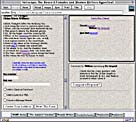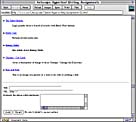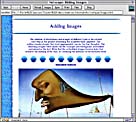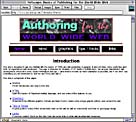| Daniel Anderson would like to focus on the web environment with narratives about the development of some CGI scripts and discussion of student HTML projects. | |
|---|---|
 At the Computer Writing and Research Labs we have an autonomous Web server where we can experiment with the development of
more sophisticated Web operations. One of the first and most useful of these
experiments was the development of Web-based message forums. Over time we've
been able to develop scripts for Web-based
conversations and text annotation. At the Computer Writing and Research Labs we have an autonomous Web server where we can experiment with the development of
more sophisticated Web operations. One of the first and most useful of these
experiments was the development of Web-based message forums. Over time we've
been able to develop scripts for Web-based
conversations and text annotation.  A second script was developed to allow
students to contribute links to their class pages. The narrative about the
evolution of this script suggests that we don't always have to contort our
pedagogy to mesh with technology; instead we can adapt technology to meet our teaching goals. A second script was developed to allow
students to contribute links to their class pages. The narrative about the
evolution of this script suggests that we don't always have to contort our
pedagogy to mesh with technology; instead we can adapt technology to meet our teaching goals.
Over the years we've developed a number of scripts that we would like to talk about and share. If you're interested check out all of the cgi scripts discussed in this project | Perhaps
the brightest spot on the Web for us as teachers has been the substantial amount
of student HTML projects that we have been able to shepherd through development. One of our recent
assignments worked at taking a
print-based persausive essay and turning it into a Web project. A large aim was
to avoid simply "pasting" the papers to the Web. We thought about the papers
in terms of pieces of information and also tried to maximaize the potential for
visual and hypertextual composition on the Web. The assignments for the process
are on the Web. To see how we did take a look at the Web-based arguments.
|

